Margaret Karram: the first words of the new President of the Focolare Movement
How to watch English subtitles, click here https://youtu.be/QW3HIijcpqY
How to watch English subtitles, click here https://youtu.be/QW3HIijcpqY
Elected on 31 January, she is the third President to lead the Movement after the founder, Chiara Lubich, and after Maria Voce who has just completed two terms. PRESS RELEASE – 1st February 2021 Yesterday, Margaret Karram, was elected President of the Focolare Movement with more than two thirds of the votes cast among the participants in the General Assembly of the Movement, composed of 359 representatives from all over the world. She succeeds the founder Chiara Lubich and Maria Voce who was in office for 12 years (two terms). Margaret Karram was born in Haifa, Israel in 1962 into a Palestinian Catholic family. She holds a B.A. in Jewish Studies from the American Jewish University in the United States. She has held various positions for the Focolare in Los Angeles and in Jerusalem. Her past experience includes membership of various commissions and organizations for the promotion of dialogue between the three monotheistic religions, such as the Episcopal Commission for Interreligious Dialogue, the Assembly of the Catholic Ordinaries of the Holy Land and the ICCI (Interreligious Coordinating Council in Israel). She worked for 14 years at the Consulate General of Italy in Jerusalem. Since 2014, she has been at the International Centre of the Focolare as councillor for Italy and Albania and co-responsible for Dialogue between Ecclesial Movements and New Catholic Communities. She speaks Arabic, Hebrew, Italian and English. In 2013 she received the Mount Zion Award for Reconciliation, together with the scholar and researcher Yisca Harani, for their commitment to developing dialogue between different cultures and religions. In 2016 she received the St Rita International Award for having promoted dialogue between Christians, Jews, Muslims, Israelis and Palestinians, starting from people’s everyday life. The election took place yesterday, 31 January 2021, but her appointment only became effective today, following confirmation by the Dicastery for the Laity, Family and Life, as envisaged by the General Statutes of the Focolare Movement. The document expresses the hope that the new president will be able to carry out her task “with faithfulness, in a spirit of service and ecclesial sensitivity, for the good of the members of the Movement and of the universal Church.” Duties of the Focolare President According to the Movement’s General Statutes, the President is chosen from among the focolarine (consecrated women with perpetual vows) and will always be a woman. In the Statutes we read, she “is the sign of the unity of the Movement”. This means that she represents the great religious, cultural, social and geographical variety of those who adhere to the spirituality of the Focolare in the 182 countries where the Movement is present and who identify with the message of fraternity that the founder, Chiara Lubich, drew from the Gospel: “Father, that they may all be one” (Jn 17:20-26). There are many commitments and challenges awaiting Margaret Karram in the coming years: the tasks of governing and directing a worldwide Movement like the Focolare, which is deeply immersed in local and global realities and the challenges of humanity, starting from this time of pandemic. The Statutes also indicate the “style” that should distinguish the work of the President: “Hers is to be, above all, a presidency of love – they state – because she must be the first in loving and, therefore, in serving her own brothers and sisters, remembering the words of Jesus: “Whoever wishes to be first among you must be the servant of all” (Mk 10:44). The primary commitment of the President, therefore, is to be a builder of bridges and a spokesperson for the central message of the spirituality of the Focolare, ready to practise and spread it, as we read further on, even at the cost of her own life. The next steps of the General Assembly of the Focolare are the election of the Co-President this afternoon and of the councillors on 4th February. Stefania Tanesini -Cell. +39 338 5658244 Text in PDF
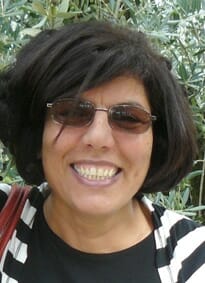
The new president of the Focolare Movement for the next six years is Margaret Karram, born 1962 in Haifa (Israel).  The election, which required a two-thirds majority of those present, took place on Sunday 31 January, and has been approved by the Dicastery for the Laity, Family and Life, in accordance with the Movement’s Statutes. The new President – who by Statute will always be a woman – is to guide the Movement through the next six years. The current General Assembly of the Focolare Movement, which elected the new President, is being conducted entirely online due to the pandemic. It began on January 24 and will conclude on February 7, 2021. It’s the third General Assembly since the death of founder Chiara Lubich. 359 people are taking part around the world. They represent some of the different cultures, generations, vocations, members of different churches and religous faiths who are part of the Focolare Movement. With the election of the President, on February 1 the Co-President will be elected, who according to the Statutes must be a Focolarino priest, then the counsellors who will collaborate in the central governance of the Movement. Press statement to follow.
The election, which required a two-thirds majority of those present, took place on Sunday 31 January, and has been approved by the Dicastery for the Laity, Family and Life, in accordance with the Movement’s Statutes. The new President – who by Statute will always be a woman – is to guide the Movement through the next six years. The current General Assembly of the Focolare Movement, which elected the new President, is being conducted entirely online due to the pandemic. It began on January 24 and will conclude on February 7, 2021. It’s the third General Assembly since the death of founder Chiara Lubich. 359 people are taking part around the world. They represent some of the different cultures, generations, vocations, members of different churches and religous faiths who are part of the Focolare Movement. With the election of the President, on February 1 the Co-President will be elected, who according to the Statutes must be a Focolarino priest, then the counsellors who will collaborate in the central governance of the Movement. Press statement to follow.
Lorenzo Russo – Focolare Communications Office
We always have only one moment in which to love God and our brothers or sisters: the present moment. Chiara Lubich taught this concept with wisdom and simplicity. Committing ourselves to living the present moment well is a method whereby each of us can be fulfilled and achieve happiness. There are, even among us, those who finish their Holy Journey after a long wait and those who finish it in a flash, when they least expect it. And so the question arises: what will it be like for us? And the conclusion comes naturally: it is good to always be prepared. In what way? By remaining in the grace of God and living the present moment to the full. It was for this reason […] that in these last few days I focused my attention once again on that very characteristic aspect of our spirituality that consists in concentrating on living the present moment. And my thoughts turned to so many phrases taken from the saints, for example, that encourage us to put this into practice perfectly. Do you remember? St. Catherine of Siena said: “We do not possess the toil of the past, because that time has escaped us; nor the toil that is to come, because we cannot be certain of having that time.”[1] By saying this, she extended an invitation to live the present. And St. Therese of Lisieux: “You know, my God, that to love You… I only have today.”[2] Then I remembered a motto that was useful to us in the past and which we remembered very easily because each word [in Italian] began with an “s”: Sarò Santa se Sono Santa subito, (I will become a saint if I am a saint straightaway). During these few days I have often noticed that this way of living our life was precious also to other saints who recommended it warmly. St. Paul of the Cross wrote “Fortunate is the soul which rests ‘in sinu Dei,’ without thinking of the future, but manages to live moment by moment in God, with no other concern than to do his will well in all that happens.”[3] “Fortunate is that soul…” We can make this fortune our own, because it is part of our spirituality to live like this. It is by living in the present that we can fulfil all our duties well. It is by living in the present that crosses become bearable: with good reason this practice is recommended for those who are nearing death. It is by living in the present that we can grasp God’s inspirations, the impulses of his grace that come to us in the present. […] So let’s live the present moment! […] Let us live it to perfection! In the evening of each day and in the evening of life we will find ourselves full of good works that have been accomplished and acts of love offered. …
Chiara Lubich
(Taken from a telephone Conference Call, Rocca di Papa, 23 October 1986) [1] St Catherine of Siena, Her Letters, II, Paoline, Alba 1966, p. 97. [2] St. Therese of the Child Jesus, Complete Works, LEV, Vatican City 1997, p. 626. [3] Paul of the Cross, Letters, I, Pontifical Institute of Pius IX
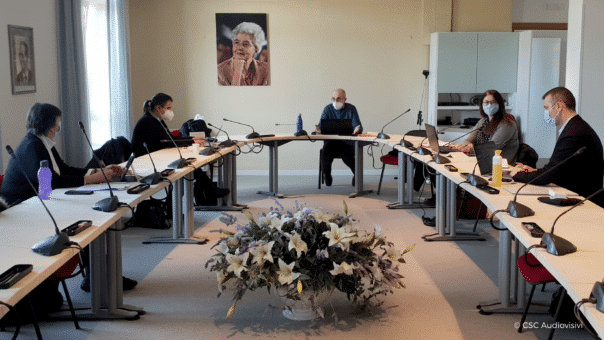
General Assembly Diary 8 – January 31, 2021 “Listen to the voice of the Lord today”! These words, taken from Psalm 94/95, “the thought for the day”, also known also as “Passaparola”, which reaches Focolare members worldwide daily, could not have been more appropriate. In fact, the elections for the future President of the Focolare Movement started today, and the first priority for the voters is to listen well to the voice of God to identify the right person who would be the president for the next six years.

Electoral commission
An electoral commission, presented to the Assembly and confirmed at its first plenary session on January 24, ensures that election rules are followed. The five members are all legal experts: Danilo Virdis, a married focolarino from Italy; Flavia Cerino, a focolarina from Italy, Laura Bozzi, a volunteer from Italy; Waldery Hilgeman, a volunteer from Holland and Sr. Tiziana Merletti, an Italian Franciscan. The election process will continue tomorrow, February 1. Once the President has been elected, the Co-President will be elected in the same way.
Communication Office of the Focolare Movement
How to watch English subtitles, click here https://youtu.be/WXdE7Z4PfU0
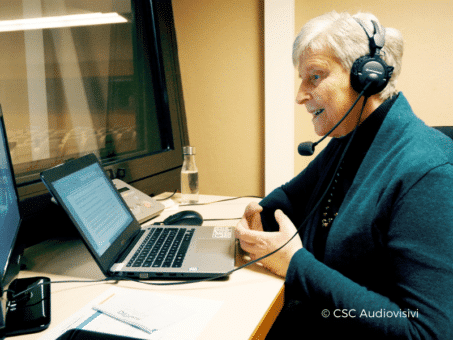
General Assembly Diary 7 30 January 2021 As the Assembly continues to work on the priorities and lines of action for the next six years, today we’d like to offer a glimpse behind the scenes, to get to know the people who are keeping the “machine” working, without whom none of this could happen. The online nature of the event called for a network of collaborators and technicians specialized in different fields, indispensible not only for the efficacy of the digital platform but also to guarantee the juridical validity of this Assembly. 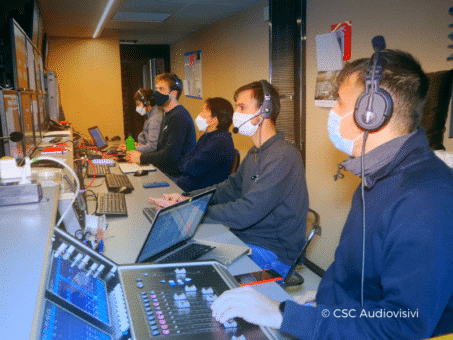 No less than 73 people comprise the technical team of the Focolare General Assembly. Many are physically present in the Movement’s international centre at Rocca di Papa in Italy, while others collaborate remotely from many parts of world including Brazil, the Philippines, France, Guatemala, Britain, Ireland, Italy, the Netherlands, Spain, Thailand and USA. Twenty I.T. experts are working on the web pages and various apps. 14 hosts, divided into two teams, run all the various video-conferences. 34 translators in 7 countries guarantee the participants have simultaneous translations in 5 languages (French, English, Italian, Portughese and Spanish). Then there is the 5-person squad responsible for the general coordination of all the technical teams. But it’s more than a network of collaborators or technical experts, according to Francesco Mazzarella, one of the video-conference hosting team working from Sicily. He writes:
No less than 73 people comprise the technical team of the Focolare General Assembly. Many are physically present in the Movement’s international centre at Rocca di Papa in Italy, while others collaborate remotely from many parts of world including Brazil, the Philippines, France, Guatemala, Britain, Ireland, Italy, the Netherlands, Spain, Thailand and USA. Twenty I.T. experts are working on the web pages and various apps. 14 hosts, divided into two teams, run all the various video-conferences. 34 translators in 7 countries guarantee the participants have simultaneous translations in 5 languages (French, English, Italian, Portughese and Spanish). Then there is the 5-person squad responsible for the general coordination of all the technical teams. But it’s more than a network of collaborators or technical experts, according to Francesco Mazzarella, one of the video-conference hosting team working from Sicily. He writes: 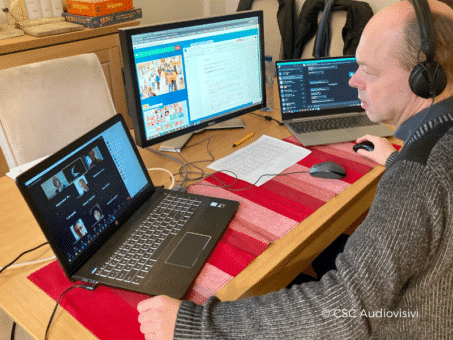 Behind the online Assembly, a group of people around the world, the so-called technical experts, have been ‘meeting’. We’ve been getting to know each other and creating a bond far beyond the technical aspect because there’s been a spiritual sharing among us too. It’s come about gradually, through a process of what we could call ‘techno-relationship’. Most of the time, we don’t think about all that has to happen before an event can take place. Today, the challenge goes via the internet, with the all uncertainties and challenges involved, and with all the possibilities it contains too. To manage these moments online without seeing each other face to face, without being able to physically shake each other by the hand, is the real challenge of this Assembly.
Behind the online Assembly, a group of people around the world, the so-called technical experts, have been ‘meeting’. We’ve been getting to know each other and creating a bond far beyond the technical aspect because there’s been a spiritual sharing among us too. It’s come about gradually, through a process of what we could call ‘techno-relationship’. Most of the time, we don’t think about all that has to happen before an event can take place. Today, the challenge goes via the internet, with the all uncertainties and challenges involved, and with all the possibilities it contains too. To manage these moments online without seeing each other face to face, without being able to physically shake each other by the hand, is the real challenge of this Assembly.  But the greatest issue for the technicians is about making a gift of our own competencies, which have been acquired through much personal sweat and study. This requires a kind of exchange of trust. Let me explain myself. A technican, even those who have made a choice to follow the principles of the spirituality of unity in their work, is still a professional who takes personal pride in their work and their own skills. The willingness to share methods or procedures that have been learnt with so much personal effort and study is not automatic. It requires a real act of faith, trusting that the others are there out of love, trusting that by so giving we are contributing to building the Assembly. So it’s a connection of electronic signals and of souls which constitutes the foundation and techo-relationships of this adventure called our online Assembly. Usually, the technicians only come to our attention when something isn’t working properly. In this Assembly, it’s different. Their work and their “style” are building this event, day by day. Thanks to each one of them!
But the greatest issue for the technicians is about making a gift of our own competencies, which have been acquired through much personal sweat and study. This requires a kind of exchange of trust. Let me explain myself. A technican, even those who have made a choice to follow the principles of the spirituality of unity in their work, is still a professional who takes personal pride in their work and their own skills. The willingness to share methods or procedures that have been learnt with so much personal effort and study is not automatic. It requires a real act of faith, trusting that the others are there out of love, trusting that by so giving we are contributing to building the Assembly. So it’s a connection of electronic signals and of souls which constitutes the foundation and techo-relationships of this adventure called our online Assembly. Usually, the technicians only come to our attention when something isn’t working properly. In this Assembly, it’s different. Their work and their “style” are building this event, day by day. Thanks to each one of them!
Focolare Communications Office
The story of Irena, a doctor in Lithuania who is a member of the Focolare Movement in Eastern Europe who was infected with the Covid-19 virus. She experienced both the fatigue of illness and the strength in God’s love through prayer. “I’m inundated with messages and prayers. I don’t even know how my friends, acquaintances, colleagues hear about it. Even friends who I didn’t even know knew how to pray are praying. I had no idea that so many people could join in prayer for my health.” Irena is a hospital doctor, a member of the Focolare Movement who lives in Lithuania, in Eastern Europe. During these months that her country has been affected by the Covid-19 pandemic, her work became exhausting, and she was infected by the virus and experienced all the fatigue of the disease. But her strength, she says, has come from her trust in God’s love. Her discovery of being united with many people in prayer rewarded her personal efforts and gave energy to her healing journey. Her experience was particularly hard. At first, work on the ward continued at the usual pace, but soon the contagion spread among her colleagues. Irena found herself working alone. “I had to find places for staff to be sent to isolation,” she explains, “to settle patients who had to be discharged because there was no one to care for them and contact relatives so they could take care of them. “There were no masks for the patients, and I would hand them out my own. Once, with a colleague who stayed after hours, we examined 37 patients. Only the night was calm, and I could pray.” After days in the hospital without rest, Irena was able to return home. Yet it was with the knowledge that she had contracted the disease. She was relieved to feel the spiritual closeness of Focolare founder Chiara Lubich. “On the shelf next to my bed there was a photo of Chiara smiling, and I saw her as if for the first time. She smiled at me and I smiled at her, everything became easier.” Gradually, the symptoms of the disease became more burdensome, but Irena did not give in to the pain. “I lost my taste receptors and realized that even the sense of taste is a gift from God. I offered my suffering for my colleagues and for my country. The nights were very difficult, but Chaira was with me smiling.” When the disease became more aggressive, hospitalization became inevitable, and this brought new challenges. “I no longer had the strength to speak, and I underwent an experimental treatment. The person in charge took care of me, but the nurses forgot to bring me my medication and didn’t ask if I had the strength to take food from the cart. But I could offer these hardships as well.” Here, too, help came from those close to her. “In my room there was a lady with cancer, and she brought me food, drinks. We became friends, and when I felt better, we prayed together.” Feeling united in prayer with the many people who prayed for her allowed Irena to feel loved, by God and by her brothers and sisters. “I am grateful to God for the indescribable love that I experienced during my illness,” she says, “because I always felt him near me, and for the beautiful experience of common prayer, which has huge power, and God has allowed me to experience it live. I feel reborn.”
Claudia Di Lorenzi
How to watch English subtitles, click here https://youtu.be/_K8Vbe0_LCk
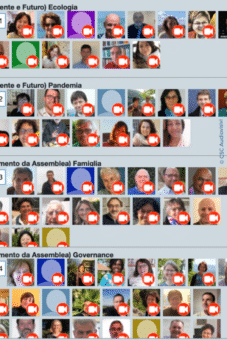
General Assembly Diary 6, 29 January 2021 “Open Space Technology” is being adopted by the Focolare General Assembly to conduct its group work today and tomorrow. The system permits the 359 participants linked online around the world to divide into virtual working groups to speak and dialogue in a more intimate way, as if seated around the same table.  To facilitate participation across all the lines of latitude, the work sessions are organized in three different time zones, corresponding to the geographical groupings of Asia and Oceania; Africa, Europe and the Middle East; the Americas. The fact that the Assembly is dedicating several days to working in groups, to consider and discuss a range of topics, demonstrates the strongly-felt need for a global dialogue at the heart of it all. This was evident from the start of the pre-assembly process two years ago which got many different Focolare communities around the globe involved. Individuals and groups participated in a worldwide program of reflection, and sent the Assembly Planning Commission over 3,000 proposals of what should be covered in these days. These ideas were gathered and collated into 16 general topic areas. From these, a subsequent international survey among Focolare members identified four priority themes: – a profound consideration of the roots of the charism of unity today; – implementing the charism in all areas, in collaboration with the Churches, with institutions, with the faithful of different religions and with people of good will; – giving particular attention to an integral ecology which considers how to take care of the person, the family and our common home, with an outlook to the future; – living inter-generational dialogue, particularly with the new generations. During these opening days of the Assembly, the participants have added another three macro-groups of topics, namely: – family – governance – option for the least, for the excluded. What emerges from the working groups over these days will form a substantial contribution to the production of the ‘final document’ which will outline the future direction and prospects “for the guidelines that will be elaborated and implemented above all locally and in profound synergy between the international centre and the Movement present in the different geographical zones”, as Maria Voce said yesterday. The final document will be drawn up by an editorial team of eight Assembly members. The text will then be presented for approval by the whole General Assembly.
To facilitate participation across all the lines of latitude, the work sessions are organized in three different time zones, corresponding to the geographical groupings of Asia and Oceania; Africa, Europe and the Middle East; the Americas. The fact that the Assembly is dedicating several days to working in groups, to consider and discuss a range of topics, demonstrates the strongly-felt need for a global dialogue at the heart of it all. This was evident from the start of the pre-assembly process two years ago which got many different Focolare communities around the globe involved. Individuals and groups participated in a worldwide program of reflection, and sent the Assembly Planning Commission over 3,000 proposals of what should be covered in these days. These ideas were gathered and collated into 16 general topic areas. From these, a subsequent international survey among Focolare members identified four priority themes: – a profound consideration of the roots of the charism of unity today; – implementing the charism in all areas, in collaboration with the Churches, with institutions, with the faithful of different religions and with people of good will; – giving particular attention to an integral ecology which considers how to take care of the person, the family and our common home, with an outlook to the future; – living inter-generational dialogue, particularly with the new generations. During these opening days of the Assembly, the participants have added another three macro-groups of topics, namely: – family – governance – option for the least, for the excluded. What emerges from the working groups over these days will form a substantial contribution to the production of the ‘final document’ which will outline the future direction and prospects “for the guidelines that will be elaborated and implemented above all locally and in profound synergy between the international centre and the Movement present in the different geographical zones”, as Maria Voce said yesterday. The final document will be drawn up by an editorial team of eight Assembly members. The text will then be presented for approval by the whole General Assembly.
Focolare Communications Office